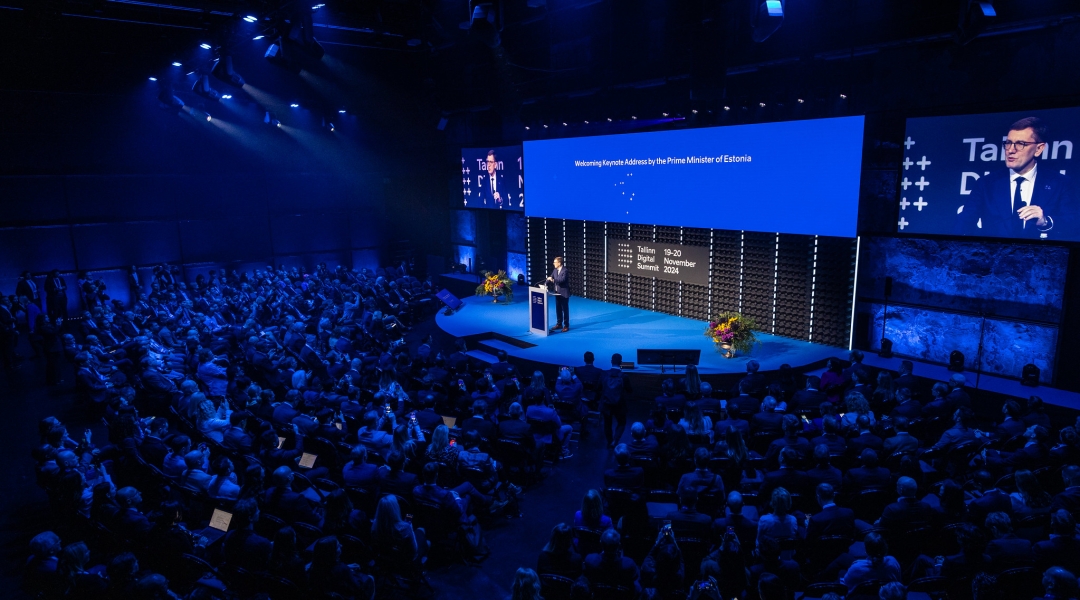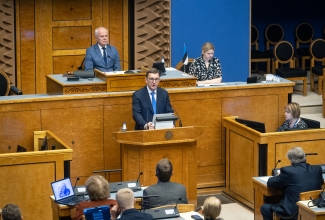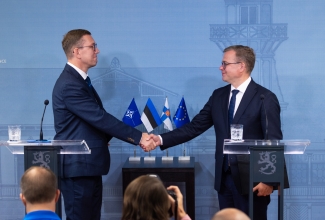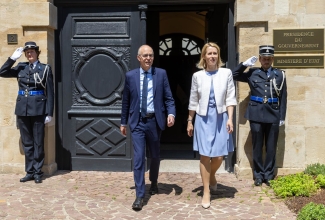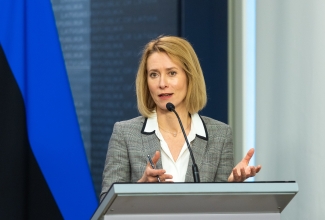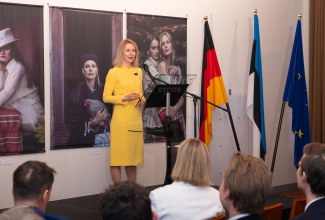The world in 2024 is changing rapidly, and not for the better. The global landscape has become increasingly confrontational. For nearly three years now, the full-scale war in Europe has been devastating Ukraine. Escalating tensions in the Middle East threaten to spark a major regional catastrophe. Rogue regimes in Russia, North Korea, and Iran remain far from isolated. The US-China-EU triangle is full of tensions. NATO faces a wide spectrum of challenges, while new administrations in Brussels, Washington DC, New Delhi, London, and elsewhere are turning to technology investments to strengthen their economies and security. Yet they must navigate an environment that is increasingly marked by confrontation and protectionism. Sometimes it feels that cooperation is overshadowed by fierce competition.
The title of this year’s event is “Securing the Digital Tomorrow”. On the thousandth day of the full-scale war in Ukraine, this message is more relevant than ever. Just as in the battlefield in Ukraine, the struggle between democracy and autocracy is unfolding in the realm of technology. It is our task to demonstrate that technologies can and should be used for democratic and not for autocratic purposes. We must embrace technological development and innovation, we must be ready to adopt digital technologies, despite the accompanying risks. In short, even in challenging times, we choose optimism.
Dear friends,
I would like to highlight three key topics today.
First – defence innovation.
Digital technology is a powerful tool for development, good governance and delivering public services. This is equally true for emerging and developing countries, as well as for the developed world. Additionally, the free world needs technology to defend itself. Cyber-attacks on critical infrastructure, including energy grids, pipelines and supply chains, require adequate reaction. Technological superiority is not a given, it needs constant attention and investment. We cannot afford to lose this competition to non-democratic countries.
The widespread use of drones, robots, and the growing role of artificial intelligence (AI) in modern warfare are trends we must address. While AI must be used responsibly, with careful consideration of risks and protection of individual rights, we must avoid overregulation and find solutions for using AI in areas where it helps society function better or counter the threats we face. It also means we should not shy away from incorporating AI into military technology. It’s clear that our adversaries will use AI. We must be ready and prepared for that reality. For smaller countries like Estonia, the effective use of electronic warfare, AI, automation, and other advanced technologies can serve as a force multiplier, helping us overcome numerical disadvantages, such as those posed by the Russian threat.
The fastest pace of innovation in military technology is happening in the trenches of Ukraine. Ukrainians developing and testing new technologies under extremely challenging conditions. Drones, sensor systems, and targeting systems are already being powered to some extent by AI.
However, it is also our responsibility, as part of the free world, to provide Ukraine with whatever they need to win this war, including advanced technologies and weapon systems. A lot is being done through different coalitions. I am pleased that since September 2023, Estonia has co-led the IT Coalition together with Luxembourg. This Coalition focuses on building secure and resilient information and communications technologies’ infrastructure for the Ukrainian Ministry of Defence and the Armed Forces. We support them in achieving technological superiority in the battlefield. The initiative has been progressing successfully, with 17 official members and growing.
Second – resilience of our societies.
Digital technology is far more than just a tool for military security or applications. That would be too narrow and destructive. Digitalisation is not only about technology, solutions, or information systems. At its core, it is about well-being, cohesion, and resilience of our societies. Estonia’s digital journey is well known. Our success over the past 30 years of independence is largely due to our bold use of technology and large-scale digitalization of society. Our score card is very good. But there is a flip side.
Our growing vulnerability in the cyber domain is a reality we cannot ignore. Hybrid warfare on the civilian front is a new challenge we must face. We’ve seen how water supply, migration, and even information can be weaponized. Elections have been manipulated, and hostile actors have used unauthorized means to create instability, sow fear, and weaken societal trust. Estonia has been a target of several Russian hybrid operations. What began in 2007 with the first recognized cyberattacks on government institutions has continued in various forms. For instance, in 2023, Russian intelligence services launched a coordinated campaign to undermine Estonia’s security, including physical attacks on property, some of which were thwarted, while others were carried out.
Our response must be to strengthen our resilience – at the societal, state, and democratic community levels. It is vital that we enhance cooperation, including within NATO, to raise awareness and develop new response measures. One possibility for coordinated response is public exposure and attribution of offenses. For example, this September, Estonia attributed the 2020 cyberattacks against Estonia to concrete members of Russia’s military intelligence. It is the first time in history that Estonia has attributed cyberattacks against the state to the perpetrator of the attacks.
Last, but not least – cooperation for good technology governance.
Estonia has pushed for digital topics in global politics for more than 15 years. We actively share our experience with partners around the world because we believe digitalisation is key to strengthen democracy. We are not alone in this effort. The entire democratic world, including the EU, recognizes the need to improve digital technologies and governance. The work in this area is speeding up, and more and more countries are focusing on what "good" digital governance should look like.
We are at a crucial moment. For the first time in history, the world has agreed upon common principles for digital cooperation. On September 22 this year, world leaders met in New York for the United Nations’ Summit of the Future and adopted the Global Digital Compact, a framework for governing digital technology and AI. This gives us a shared starting point for global digital cooperation.
We’ve also made progress through initiatives like the Hiroshima Process and the Bletchley Declaration, where countries agreed on data governance and AI principles. Work continues through platforms like the Internet Governance Forum (IGF), the World Summit on the Information Society (WSIS), and the Freedom Online Coalition (FOC), which Estonia will chair in 2025. These platforms help shape policies around the Internet, and their impact will be significant. We need to strengthen global cooperation in shaping our digital world.
Cooperation is key. To build strong relationships, we need to pursue digital solidarity – sharing information and supporting each other with digital tools in times of need. Let’s not just collaborate, let’s build together. NIIS/X-road is already showing the way. Projects like GovStack and the EU Digital Infrastructure Consortia can be mentioned on the same note. The Nordic-Baltic region is moving quickly in this regard. These small countries, some of them the most innovative countries in the world, have much to gain from closer alignment. I’m pleased that Nordic Prime Ministers recently agreed on a declaration to extend the freedoms of movement to the digital world, reflecting the close work they’ve done with Estonia, Latvia, and Lithuania.
Dear guests
I have only touched on a few of the key topics that will be discussed on this stage today and tomorrow. To conclude, let me turn to history and quote a book, that was first published nearly 160 years ago. In Lewis Carroll’s Alice in Wonderland, the Red Queen famously stated: "Now, here, you see, it takes all the running you can do, to keep in the same place. If you want to get somewhere else, you must run at least twice as fast as that!"
With that in mind, I wish you days full of thought-provoking ideas, inspiration and out of the box thinking. May we all find the energy to run twice as fast in ongoing digital race, to secure our digital tomorrow.
Thank you!
